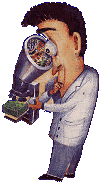|
In this section:
Chance or Design? •
The Scientific Method •
Life in a Test Tube? • The Eye •
Irreducible Complexity •
Anything Can Happen? • Evolution or Selection?
• Real Examples of Evolution •
"Do You Feel Lucky?" • (Abio)Genesis
1:1 • Life from Comets? •
Life on Mars? • Richard
Dawkins • A Brief History of Slime...
In the beginning . . .
Simply natural or simply Supernatural?
 |
Life: The spirit of God
or just beating the odds?
|
 |
Life forming on its own is a remote probability,
but the estimates of the probabilities involved are subject to a wide
range of assumptions. Abiogenesis theory greatly reduces the odds by assuming that
life formed in a series of steps, from the simplest of molecules to
the first cell.
So maybe Earth won the planetary lottery of life?
Some supporters of evolution as an explanation
for life's origins present a case that the probabilities of life forming on
its own are much better than for you winning the Lotto, perhaps only
one in a million (106) instead of the hopeless odds of one in
1040,000 calculated by astrophysicist Fred Hoyle.

Where would you bet YOUR money?
Let's say "You win!" and assume for a moment that they're right. We're
still left with several problems:
-
 If the odds that life formed on its own are one in a
million, then aren't the odds for the other alternative, life not
being formed on its own, (e.g., Divine creation),
a million to one? What rational person would choose the first
bet over the second bet? If the odds that life formed on its own are one in a
million, then aren't the odds for the other alternative, life not
being formed on its own, (e.g., Divine creation),
a million to one? What rational person would choose the first
bet over the second bet?
-
There is no evidence that all the intermediate steps
proposed by abiogenesis theory can exist in nature. A scenario describing the
genesis of life on earth by chance and natural causes which is based on fact and not faith has not yet been
written. On the other hand, even though we can't control it
or measure it, there is evidence of God's existence, from miraculous
healings in response to prayer to faith itself, which is awareness,
and evidence, of an external force. Where is our
faith best placed: In incredible odds or in an incredible God?
Life: More than the some of its parts?
 |
You could put a frog in a blender and have not only all the essential
proteins for life, but complete cells that surpass any
dreamed of by abiogenesis theory. What you won't have, however,
is life. Dead
cells remain dead no matter what is done to them. Life does
not simply consist of a mere assemblage of the right compounds or
proteins. It's a dynamic system
of unparalleled precision in design, from the simplest cell to human
beings. And just as with a car found running, don't we still have to ask, "who
turned the key?"
|
Was the universe designed to support life?
Consider the words of Stephen Hawking:
 "The laws of science, as we know them at present, contain many
fundamental numbers, like the size of the electric charge of the
electron and the ratio of the masses of the proton and electron.
... The remarkable fact is that the values of these numbers seem to have
been very finely adjusted to make possible the development of life." "The laws of science, as we know them at present, contain many
fundamental numbers, like the size of the electric charge of the
electron and the ratio of the masses of the proton and electron.
... The remarkable fact is that the values of these numbers seem to have
been very finely adjusted to make possible the development of life."
And these words of Sir Fred Hoyle, Astrophysicist:
"A common sense interpretation of the facts suggest that a
superintellect has monkeyed with the physics, as well as with chemistry
and biology, and that there are no blind forces worth speaking about in
nature."
The unbiased scientific conclusion:
Intelligent Design
 Science is based on observation of evidence and logical inference. Science is based on observation of evidence and logical inference.
What do we observe? That life only comes from existing life and not
from inanimate matter or even dead cells.
What do we logically infer? That life forming on its own is far less
likely than it being caused.
Wouldn't the scientific
method lead anyone acting without
any bias or prejudice to
conclude that intelligent design is far more likely and reasonable than
life happening on its own?
But isn't it a fact that evolution occurred?
|

